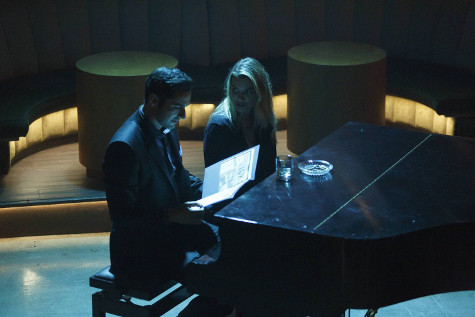
Last week, Lucifer dropped the bomb that Earth was his home all along—a revelation that Mum eagerly wanted to exploit—and this week, we see Lucifer struggling to hold onto that home in the face of eviction. However, while Lucifer may not see heaven as his home, he was still tossed out on his ear—although what that looked like is harder to imagine.
Lucifer is losing Lux to some zealous real estate developers and proudly claims that none of them will be able to evict him, saying the “last time it took the power of God” to do so—which is how most people will remember the story going. Biblically, however, we have to go back to the Revelation of John, where we see “the great dragon was thrown down, that ancient serpent, who is called the Devil and Satan, the deceiver of the whole world—he was thrown down to the earth, and his angels were thrown down with him” (Rev 12:9 NRSV). This is again where the angel Michael defeated Satan in battle.
Interestingly, however, just a couple of verses later, another reference is made that insists Michael and the other angels “conquered [Satan] by the blood of the Lamb and by the word of their testimony” (Rev 12:11). This is clearly a reference to Jesus, who has thus far remained completely absent from the show. There have been plenty of references to angels and demons and allusions to biblical events, Dante, and more, but nothing has gotten close to mentioning Jesus until now.
But even this is oblique at best. Christ doesn’t make an appearance or do battle with Satan; it is by proxy, with Michael doing all the fighting. That is until we look at a different take on the events with John Milton’s Paradise Lost, which we need to do since Revelation states quite clearly that Satan was cast down to Earth, not hell. Milton shows “Hell at last / Yawning received them whole, and on them clos'd,” (VI, 874-875). But, instead of Michael defeating Lucifer, as it is in Revelation, Milton has Jesus show up (as the Son) to “[drive] [the fallen angels] before him Thunder-struck” (VI, 858).
However, not only is the appearance of Jesus in this context interesting, but so is the method in which Lucifer and the fallen depart heaven. Instead of being thrown down, as Revelation states, Milton writes, “headlong themselves they threw / Down from the verge of Heav'n” (VI, 864-5). So great is their terror at the power of the Son, the rebellious angels can’t stand to be there any longer and must flee, casting themselves out of heaven and into hell.
 So Lucifer is correct, in a way, that it took the power of God to evict him from heaven—or the Silver City as they are all referring to it now—yet the most informative versions of this event mention Jesus as the actual power to do so. Other versions of the story exist, but they are sparse in the details, such as the non-canonical The Life of Adam and Eve, which only states that “the Lord God grew angry with [Lucifer] and sent [him] forth with [his] angels from [their] glory.”
So Lucifer is correct, in a way, that it took the power of God to evict him from heaven—or the Silver City as they are all referring to it now—yet the most informative versions of this event mention Jesus as the actual power to do so. Other versions of the story exist, but they are sparse in the details, such as the non-canonical The Life of Adam and Eve, which only states that “the Lord God grew angry with [Lucifer] and sent [him] forth with [his] angels from [their] glory.”
The Milton version of the story, while not canonical, presents an interesting narrative twist that supports Lucifer’s assertion that the Silver City is “not my home, it never was.” This version of heaven is unwelcoming to him, and so when presented with the opportunity to leave, he cast himself out rather than remain in such a place, even though it took him straight to hell.
But home has never simply been geography, as Linda points out that Lucifer is “either running from something or looking for something.” Heaven was never his home, and hell was only a place of punishment for him to oversee. Earth may be his home of choice, but he ”didn’t realize how true it was until he yelled it in [Mum’s] face.” Yet, he doesn’t understand the why of it.
By the end, he admits that “the walls didn’t make it my home” and insists that it was “the women.” But even this sounds hollow. Earth was an escape, a place of pleasure away from the oppression of heaven and the drudgery of hell. It’s not until Chloe saves Lux without asking for anything in return that Lucifer faces a truth that scares even him: revealing his true self to Chloe. He can’t face the possibility of her rejection because he “cares that much about what she thinks of [him].”
Mum is adamant that returning to the Silver City is about going back to family, but while Lucifer is trying to save his home from destruction, she is prepared to destroy it in order to motivate him to return to heaven with her. Maze clearly thinks she is capable of such treachery—and she is right, given how the episode ends—and even Amenadiel isn’t sure of what Mum will do.
Amenadiel believes her tryst with Dan is simply an exploration of physical pleasure and happiness, while Maze enjoys the emotional torture of painting the picture of his mother having sex. Mum, though, is always pursuing her agenda, gathering intelligence on Chloe and preparing to strike. Since Mum came into the picture well after it was revealed that Chloe has some effect on Lucifer’s powers and invulnerability to human weapons, it’s unlikely that she knows just how special Chloe is. It’s also been some time since we’ve seen anything supernatural about Chloe. The cliffhanger certainly teases that Chloe will need some kind of divine intervention.
See also: Death’s Blade: Exploring the Mythology Behind Lucifer, Episode 2.08: “Trip to Stabby Town”
Andy Adams is an adjunct professor of English at various colleges in the Phoenix area. He has an affectation for fedoras as they complement his villainous goatee. He’s been known to poke his head onto Twitter @A3Writer, but he’s never been big into birds. He blogs at A3writer.comabout writing, teaching, and the conquest of fictional worlds—they’re more fun than the real world.
Read all posts by Andy Adams for Criminal Element.

In Yining city, the capital of Ili, a shared online document with over 300 urgent requests for food, medicine and sanitary pads was widely circulated.